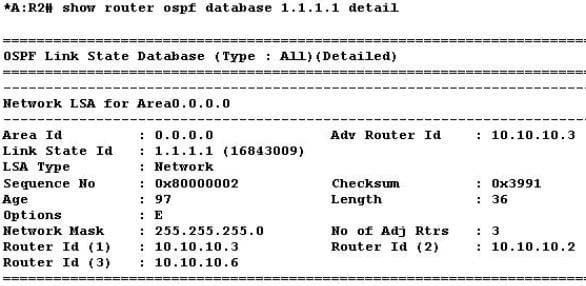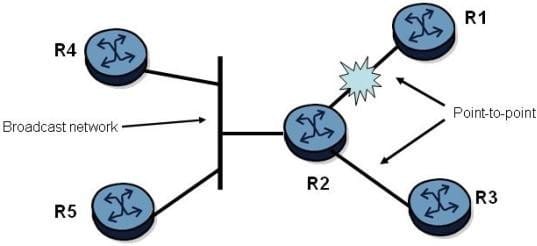4A0-101 Online Practice Questions and Answers
Which of the following is NOT a characteristic of RIPv1?:
A. 30 second network updates
B. Classless routing
C. Broadcast advertisement
D. Poison Reverse
The Alcatel-Lucent 7750 SR supports which two of the OSPF area types below?
A. Not So Stubby Areas
B. Level 1 Areas
C. Stub Areas
D. Partially Stubby Areas
Which of the statements below best describes the operation of the IPv6 anycast address?
A. A packet with a destination anycast address is sent to all nodes on the local link.
B. A packet with a destination anycast address is sent to all nodes on the local network.
C. A packet with a destination anycast address is sent to all nodes that have joined the anycast group.
D. A packet with a destination anycast address is sent to the nearest node that is assigned the anycast address
E. A packet with a destination anycast address is sent to all nodes that are assigned the anycast address.
What is the replacement for ARP in IPv6?
A. The use of Broadcast messages in combination with Neighbor Advertisement messages.
B. The use of Anycast addresses in combination with Neighbor Advertisement messages.
C. The use of Solicited-node multicast addresses in combination with Neighbor Advertisement messages.
D. The use of Anycast addresses in combination with Link-Local Advertisement messages.
Which OSPFv3 LSA advertises an ASBR?
A. AS Summary
B. Inter-Area Network
C. Inter-Area Router
D. Intra-Area Prefix
Click on the exhibit.

Which router is the designated router for the broadcast network?
A. 10.10.10.2
B. 10.10.10.3
C. 10.10.10.6
D. There is not enough information given to determine the designated router.
What is the primary purpose of variable length subnet masks (VLSM)?
A. To reduce the size of each routing update.
B. To allow interoperability between routing protocols.
C. To allow different subnet masks for different subnets.
D. To reduce the size of the routing table.
Which of the following is a type of authentication that is supported by OSPF on the Alcatel- Lucent 7750 SR?
A. Challenge handshake authentication protocol (CHAP)
B. Two factor authentication
C. MD5 authentication
D. Extensible authentication protocol (EAP)
Two IS-IS routers are exchanging Hello packets with different authentication types. Which of the following is TRUE?
A. Different authentication types are not possible because IS-IS only supports password authentication.
B. An adjacency will not be formed.
C. The two routers negotiate the authentication type and then reach the up state.
D. Only an L2 adjacency will form, as long as both routers are L2 capable.
Click on the exhibit.

OSPF router R2 has both point-to-point and broadcast interfaces and it is not a DR for any interfaces. Router R2 detects the link failure between itself and router R1.
Which of the following is correct?
A. Router R2 sends an update to 224.0.0.5 on its broadcast and point-to-point interfaces. The DR does not send any updates.
B. Router R2 sends an update to 244.0.0.5 on its point-to-point interfaces. The DR sends an update to
224.0.0.6 on the broadcast network.
C. Router R2 sends an update to 224.0.0.5 out its point-to-point interfaces and an update to 224.0.0.6 out its broadcast interface. The DR sends updates to 224.0.0.5 on the broadcast network.
D. Router R2 sends an update to 224.0.0.6 out its point-to-point interfaces and an update to 224.0.0.5 out its broadcast interface. The DR sends an update to 224.0.0.6 on the broadcast networks.